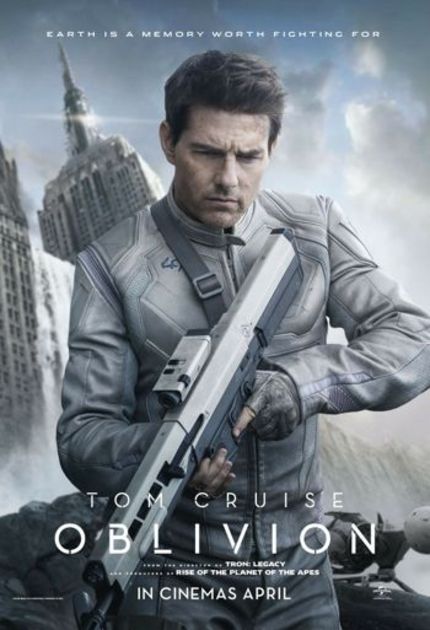Review: OBLIVION Looks Great, Sounds Like a Dozen Better Sci-Fi Flicks

Tom Cruise returns to the realms of science fiction, conspiring with Tron: Legacy's Joseph Kosinski in a big screen adaptation of the director's unpublished graphic novel. While visually spectacular and action-packed, Oblivion compromises its technical accomplishments with a sloppily executed script that borrows liberally from many beloved genre classics.
In 2077, 60 years after an alien invasion triggered a nuclear war that decimated the planet, the human race has all but abandoned Earth for Titan, the largest of Saturn's moons. Commander Jack Harper (Cruise) is the last remaining man on the planet, charged with monitoring and servicing drones, which guard huge hydroelectric generators that convert Earth's oceans into usable fuel on Titan. Together with his partner, Victoria (Andrea Riseborough) they form an effective team, dutifully fending off rogue alien "Scavengers", and carrying out the orders passed down from TET, the huge space station that orbits Earth and serves as their only contact with mankind.
However, when Harper investigates a crash site and pulls a woman (Olga Kurylenko) from the wreckage, she triggers long-dormant memories in his supposedly "security-wiped" mind, about a life before the war. When the drones attempt to kill her, Harper begins to question not only her identity, but also his own, and everything he has come to take for granted.
Science fiction is a tricky genre, because its best examples are largely ideas-based rather than spectacle-driven. Good ideas are hard to come by, while recycled ones are easy to spot. When a sci-fi film introduces a new concept that audiences haven't seen before, it is often embraced quickly, lauded as a definitive addition to the genre. When another film subsequently uses that idea again, it can have a hard time shaking off the shackles of its previous incarnation.
Essentially this is the problem at the centre of Oblivion. While the script, originally written by producer-director Kosinski together with William Monaghan (and subsequently rewritten by first Karl Gajdusek and then Michael Arndt), is entertaining, it is so obviously derivative of a succession of smarter, better-known and hugely successful films, that it is almost impossible to judge Oblivion as original. At various stages, everything from Solaris, Logan's Run, Robocop, The Matrix and Moon is either referenced lovingly or paid generous lip service. Audience's abilities to look beyond these similarities and appreciate the film on its own merits will wholly influence to what degree they enjoy the film.
Oblivion marks only the second feature film from Kosinski, but he has already come a long way from 2010's Tron: Legacy. He remains primarily a visual stylist, but while his previous effort was confined to resurrecting and revitalising an existing aesthetic, in Oblivion Kosinski has free rein to build an entire world of his own creation. And it looks phenomenal. From the scattered remains of the moon perpetually strewn across the sky, to the devastated ash-driven wastelands of what was once New York City, the world of Oblivion feels fully realised, even as the narrative resembles a mosaic of different concepts clumsily cobbled together. This synergy extends to the technology - touch screen computer consoles, high-speed gyro-pods, weaponised drones and even collapsible dirt-bikes - which all make sense as tangible possibilities within this environment, without going as far as, say, Andrew Stanton's Wall-E, in which everything appears to have been designed by Apple.
Tom Cruise is as dependable and eminently watchable as ever as Harper. He has heavy-handed "human" moments, like recounting a past Superbowl as he searches the stadium ruins, or cracking awful one-liners with his dashboard bobble-head doll, but considering the script he has to work with, Cruise adds nuance and vulnerability to the role, where it could have been lifeless and one-note. Elsewhere, Andrea Riseborough brings the strongest support, as icy partner/lover/teammate Victoria, who proves more of a stickler for the rules than Harper, but can also be threatening and tender when the moment requires it.
Kurylenko is given less to do as the mysterious, yet sexy Julia, and you'd be forgiven for not realising that Morgan Freeman was even in the movie, had the trailers and posters not told us so. To go into the details of his role, let alone those of Nikolaj Coster-Waldau and Zoe Bell, would be to plunge deep into spoiler territory, suffice to say the script gives them nothing to do except appear on screen with Tom Cruise.
In fact, those sensitive to having their enjoyment spoiled by knowing important plot developments ahead of seeing a film would be recommended to read or watch nothing about Oblivion before going in. Even mentioning some of the films from which Oblivion borrows most liberally will plant ideas in viewers' heads that I'm sure Kosinski and Co would rather weren't there. But it is impossible to review the film without pointing out such glaringly obvious similarities, although I will refrain from discussing specifics.
Taken on its own, Oblivion is a wholly watchable and oftentimes entertaining sci-fi action adventure that looks and sounds incredible on the big screen (even if Anthony Gonzalez and M83's score frequently recalls Hans Zimmer's music from Inception). However, the script is poorly written, with a few of its most integral explanations either dumped into expository speeches or skipped entirely, while all its best ideas come from the work of Andrei Tarkovsky, the Wachowskis and Duncan Jones. If that's unimportant, then Oblivion will feed your clearly starved science fiction appetite. For the rest of us, this is spectacle over substance and, at times, embarrassingly familiar.

Do you feel this content is inappropriate or infringes upon your rights? Click here to report it, or see our DMCA policy.






